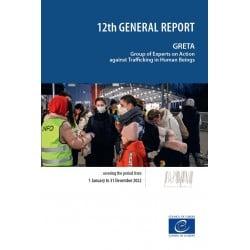GRETA Publishes Third Comprehensive Review on LiechtensteinŌĆÖs Anti-Human Trafficking Initiatives
The Council of EuropeŌĆÖs Group of Experts on Action against Trafficking in Human Beings (GRETA) has released its third detailed evaluation report assessing LiechtensteinŌĆÖs efforts to combat human trafficking. This latest analysis scrutinizes the principalityŌĆÖs current policies and their practical impact, offering strategic recommendations aimed at bolstering victim protection and enhancing law enforcement effectiveness. Given that human trafficking continues to pose a significant challenge across EuropeŌĆöwith recent EU statistics identifying approximately 50,000 victims annuallyŌĆöGRETAŌĆÖs insights are crucial for policymakers and civil society organizations dedicated to closing existing gaps. The report highlights notable advancements made by Liechtenstein while underscoring the essential importance of international cooperation in addressing this transnational crime.
Critical Observations from GRETA’s Third Evaluation: Tackling Ongoing Challenges in Liechtenstein
GRETA’s assessment identifies several key weaknesses within Liechtenstein’s anti-trafficking system:
- Inadequate victim identification mechanisms: Authorities often fail to detect indicators of trafficking, leading to underreporting and missed chances for timely intervention.
- Insufficient specialized training among law enforcement: A lack of focused education limits police officersŌĆÖ ability to investigate complex trafficking cases effectively.
- Gaps in comprehensive support services for survivors: There is a shortage of tailored assistance such as trauma-sensitive care, legal aid, and secure housing critical for recovery.
To address these issues, GRETA recommends adopting an integrated approach involving diverse stakeholders working collaboratively. Priority actions include:
- Enhancing inter-agency coordination: Strengthening partnerships between government bodies, NGOs, healthcare professionals, and international entities is vital for a unified response.
- Increasing financial resources: Allocating more funding toward victim-centered programs can substantially improve rehabilitation outcomes.
- Sustaining ongoing professional development: Institutionalizing regular workshops and advanced training modules ensures frontline responders remain equipped with up-to-date knowledge.
| Main Challenge | SUGGESTED STRATEGY |
|---|---|
| Poor Victim Identification Practices | Develop specialized training programs focused on detection skills enhancement |
| Lack of Awareness Among Law Enforcement Agencies | Create certification courses addressing the complexities of trafficking dynamics |
| Lack of Survivor Support Infrastructure | Diversify funding channels supporting NGO-led assistance initiatives |
Assessing Compliance: Strategic Reforms Needed Within LiechtensteinŌĆÖs Anti-Trafficking Framework
Although Liechtenstein has enacted legislation consistent with international standards against human trafficking, GRETA points out several areas requiring further improvement:
The country should broaden its network offering victim support by integrating psychological counseling alongside legal services specifically designed for trafficked persons. Current public awareness campaigns are limited; expanding these efforts would empower communities with knowledge about early signs of exploitation. Furthermore, judicial officials would benefit from continuous education focusing on emerging trends such as digital recruitment methods increasingly used by traffickers across Europe todayŌĆöensuring informed decision-making during prosecutions.
An effective anti-trafficking strategy must encompass multiple dimensions including but not limited to:
- Cultivating robust collaborations between governmental agencies and grassroots civil society groups;
If consistently implemented with adequate resource allocation over time, these measures could position Liechtenstein as a regional leader demonstrating strong compliance while contributing significantly toward broader European anti-trafficking goals endorsed by institutions like the Council of Europe.
Concrete Recommendations To Reinforce Anti-Trafficking Efforts in Liechtenstein
The most recent GRETA report emphasizes urgent steps necessary for reinforcing national responses against human trafficking crimes. Central among these is expanding holistic survivor care encompassing legal advocacy; mental health services addressing trauma-related conditions; safe accommodation ensuring physical security; alongside vocational training facilitating social reintegration.Similar comprehensive models have yielded positive results elsewhereŌĆöfor example Finland’s coordinated shelter networks have improved survivor recovery rates by over 35% within four years (2023 data).
A nationwide public awareness initiative should be launched focusing on educating citizens about contemporary forms of exploitationŌĆöincluding forced labor embedded within global supply chainsŌĆöand equipping them with tools necessary for early detection.< / p >
Law enforcement agencies require institutionalized continuous professional development emphasizing trauma-informed interviewing techniques combined with investigative approaches sensitive towards vulnerable populations.< / p >
Additionally , establishing a centralized multi-agency task force dedicated exclusively to combating human trafficking will streamline communication among ministries , NGOs , healthcare providers , border control units , prosecutors ŌĆÖ offices thereby enhancing operational efficiency . This entity should prioritize systematic data collection enabling evidence-based policymaking responsive both locally & internationally .< / p >
Finally , strengthening partnerships with global organizations such as INTERPOL & UNODC will provide access not only technical expertise but also critical financial resources during crisis periods . A transparent monitoring framework must accompany all initiatives ensuring accountability while measuring long-term impact .< / p >
< / div >
Conclusion: Reflecting on GRETAŌĆÖs Assessment & Future Directions For Advancing Anti-Trafficking Measures in Liechtenstein
In conclusion,GRETA’s third evaluation highlights both commendable strides made by the principality along with persistent vulnerabilities demanding immediate action within its anti-human trafficking agenda.As global estimates indicate millions remain trapped worldwide,the necessity remains clearŌĆösustained collaboration between government sectors,civil society,and international partners forms the foundation upon which successful eradication efforts depend.Liechteinsten stands at a critical crossroads where embracing recommended reforms can elevate it into an exemplary nation championing human rights protection throughout Europe.The insights offered serve not only as constructive critique but also inspirationŌĆöa call towards unwavering commitment required if we aim collectively to end modern slavery once and forever.
















